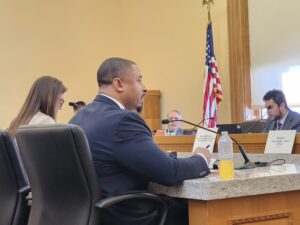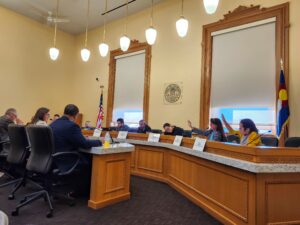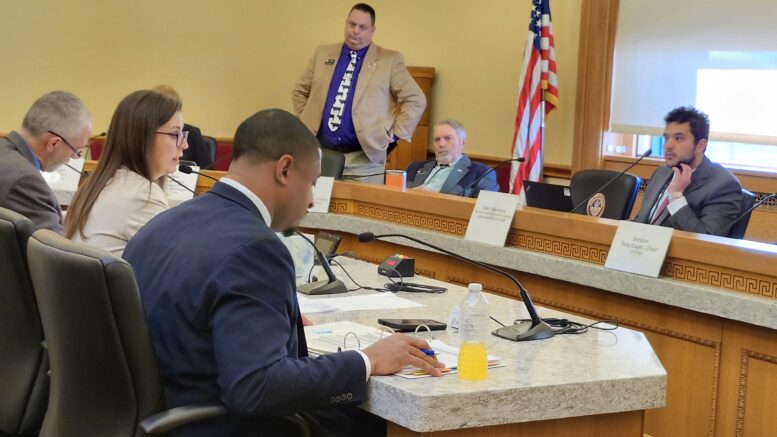A construction-defects reform bill that builders argue is integral to the state’s affordable-housing push cleared a major hurdle Thursday when it advanced through a committee that met it with significant skepticism, moving the debate to likely friendlier floor of the Senate.
Senate Bill 106, sponsored by Democratic Reps. Rachel Zenzinger of Arvada and James Coleman of Denver, eked out of the Senate Local Government & Housing Committee by a 4-3 vote, as Democratic Sen. Tony Exum joined three Republicans in supporting it. The Colorado Springs senator noted that he bought his condominium 39 years ago and said that while he wants to keep working on details within the bill, he also wants people to have the same opportunity he had to buy a home “at a reasonable price.”
The debate over the impact that Colorado’s construction-defects laws have had on the lack of condominiums in the state — they are less than 3% of the new housing stock — has been raging at the Capitol for a decade now. After a 2017 law made it harder to file defects lawsuits but failed to jumpstart the sector, the new bill seeks to give homeowners more ways to address construction issues without going to court and, in doing so, cut insurance costs that keep many builders from putting up condos.
How SB 106 addresses construction-defects reform
It does so by adding a new right-to-remedy path in which condo owners can seek repairs to alleged defects but can demand that they get them from a third-party contractor who is paid by the original builder. It also limits lawsuits to being filed over actual or imminent damages to property or health rather than technical building violations, and it requires that 60% of owners withing a condo complex — rather than just a majority — vote to proceed with legal action.
In a slew of amendments made Thursday in the committee — after a vote on the bill had been delayed several times to allow for negotiations — Zenzinger and Coleman sought to address some concerns of opponents. They clarified that the right to remedy is an option to a lawsuit rather than a required path for aggrieved condo owners, reduced the mandatory lawsuit-action vote from 67% to 60% and exempted city governments from being plaintiffs in construction-defects lawsuits.

Colorado state Sen. James Coleman answers questions Thursday about SB 106.
Sponsors also tried to add an amendment specifying what damages must be present to file a lawsuit — a change that would have called out imminent damage like mold conditions, actual damages like falling stucco or cracks revealing structural-integrity issues. However, committee members like Sen. Faith Winter, D-Broomfield, said that the amendment made conditions far more restrictive than the vague language in the bill that it was attempting to clean, and Zenzinger and Coleman agreed to hold off debate on it until it reached the Senate floor.
Continued opposition
The raft of changes did not win over opponents, as Winter, along with Democratic Sens. Sonya Jaquez Lewis of Longmont and Julie Gonzales of Denver, still voted against SB 106 on Thursday. Winter said that the bill creates too many risks for homeowners that they will not get concerns addressed by builders in exchange for what is nothing more than a “nudge” to try to get insurance costs down — a tradeoff she is unwilling to make.

Colorado state Sens. Sonya Jaquez Lewis and Faith Winter raise their hands to question sponsors of SB 106 on Thursday.
But many backers felt pleasantly surprised to see the bill make it through the committee — particularly after pre-session changes removed moderate Democratic Sen. Dylan Roberts from the panel and replaced with him with the much more progressive Winter. But Exum proved the swing vote after participating in amendment negotiations and also calling upon the industry and builders “to get back out there” and re-enter a condo market that was much more robust before passage of a 2007 law that made it easier to file defects lawsuits.
“Today was a success for attainable housing in Colorado,” said Kathie Barstnar, president of real-estate organization NAIOP Colorado and member of the Homeownership Opportunity Alliance of builders, metro mayors and housing advocates backing the bill. “Getting it out of committee in a very progressive Democratic Senate shows me this is an issue, and we need to figure out how to fix it, or we’re not going to get more housing, more condos. So, to me, this is a big victory to get it onto the floor.”
What’s next for construction-defects reform
Zenzinger is part of an active moderate Democratic block that is likely to have the votes to join with Republicans and overcome opposition from fellow party members who are concerned that the bill strips homeowners’ legal rights. However, the block of moderates is much smaller in the House, which Democrats control by a 46-19 margin, and its future seems far less certain in that chamber.
Gov. Jared Polis offered support for construction-defects reform in his January State of the State Address, calling it one part of a larger package of bills that he hopes will knock down obstacles to residential construction and increase the state’s lagging housing portfolio. That package includes Polis-spawned bills that push local governments to increase housing density around transit lines, permit urban homeowners to build accessory dwelling units as a right and eliminate local residential occupancy limits for unrelated tenants.
SB 106 is advancing simultaneously with House Bill 1230, which would roll back some protections for builders by lengthening the statute of repose for filing defects lawsuits and allow single-family home communities to band homeowners together in defects actions. That bill cleared its first committee on March 6 but has remained on the House calendar without coming up for debate since then.
